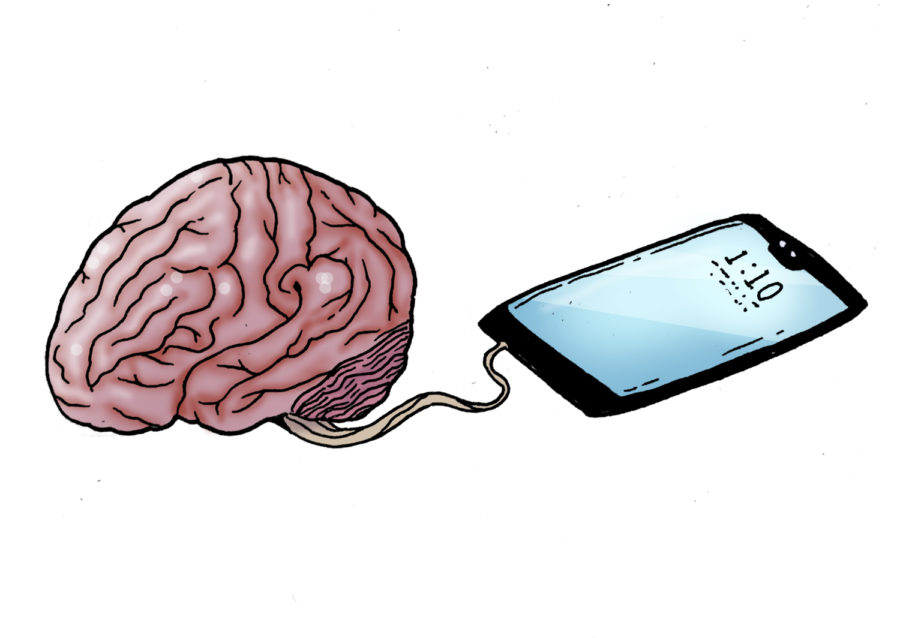Opinion | You don’t need to be informed about everything — it’s mentally exhausting
April 7, 2022
I have a really bad habit that I need to kick. Every morning, as soon as my alarm goes off, I roll over and open Twitter. I read all of the bad news, catching up on conflicts around the world as well as people’s various opinions on this news. Basically, I ruin my day before it starts.
I know I’m not the only one who does this. More than half of Americans say that constantly staying on top of the news has led to feelings of anxiety and fatigue. Being constantly bombarded with every bad thing that is going on at all times is draining. On top of that, people often feel the need to explain what they think about all this bad news, doubling the amount of discourse that’s circulated.
This constant stream of news makes me feel so mentally drained. Sometimes it’s okay to not know everything that’s going on — and it’s even okay to not comment on it. Doom-scrolling through Twitter is definitely not good for all of us mentally in the long term, and we should be able to step back and take a break from it all.
While I’m obviously privileged to be able to tune out the news, unlike those who might be in the middle of the conflicts being reported on, it’s important that everyone has the opportunity to take a step back every once in a while for the sake of their mental health. Many psychologists warn that the effects of doom-scrolling include increased anxiety and depression symptoms. It’s overwhelming to see everything bad happening all at once — especially when the issues feel large and pervasive.
The 24-hour news cycle is a primarily new phenomenon. Even 30 years ago, people could step back from the news, since there was only the newspaper and a nightly or morning newscast — there was a break built in. Now, because of new technology, social media and news channels that put out content at all times, it feels like we can’t escape it — and in some ways we can’t.
The COVID-19 pandemic exacerbated these feelings. The lack of knowledge about when we could leave quarantine or if this mysterious virus would go away led many people to search for answers. We’ve all been there — you open one article, then two, then 10, and suddenly you’ve gone down the rabbit hole and your heart has started beating at 90 miles a minute.
Psychologists refer to this phenomenon as “monitoring” — a coping mechanism when someone attempts to gain control over a situation by gathering as much information as possible. It makes sense — if you don’t know what is going on, you have a device at your fingertips that can lead you in the right direction. However, an overload of information can sometimes make you feel worse.
The constant stream of negative news also leads to a constant stream of everyone else’s opinions on various subjects. Social media makes most people believe their opinion matters — even if they’re uneducated on a matter. Not everyone is a foreign policy expert or disease researcher, meaning that it’s OK to take a step back sometimes and listen rather than give your opinion just for the sake of it. As Bo Burnham said, “Is it necessary that every single person on this planet expresses every single opinion that they have on every single thing that occurs all at the same time?”
Human beings were never meant to be this connected. Before the internet and the 24 hour news cycle, you only had access to the opinions of people you were close with physically. You knew what your mom or cousin or professor thought about a certain topic. Now, you can open up Twitter and find out anyone’s opinion on just about anything. While it can be a strength to know what other people outside your immediate circle think about things, at a point it becomes too much. You start to feel information overload and don’t know what to think.
Being shown too much of a bad thing can also lead to a general feeling of despondence, where it feels like everything is hopeless and there is no reason to care about anything. This feeling is truly frightening — if everyone collectively feels overwhelmed and hopeless, no issue will receive the attention it deserves. This can lead to activist fatigue as well, meaning people feel burned out fighting for an issue because it can feel fruitless at times to fight against the powers that be.
Taking a break seems to be the only meaningful solution to help improve mental health and avoid burnout. Stepping back can mean different things for different people. It can mean not keeping the news on 24/7, particularly after a scary event. It can mean surrounding yourself with friends but only to discuss more positive news. It can even mean muting certain words on Twitter or unfollowing some people for a bit. Anything that gives you a bit of respite is important — burnout and anxiety are not going to help you to be a successful and happy person in the long term.
For me, this may mean I have to delete Twitter for a week or two — or at least wait to check what’s trending until I drink my coffee.
Rachel Soloff writes primarily about the entertainment industry and how lame antisemites are. Write to her at [email protected].








